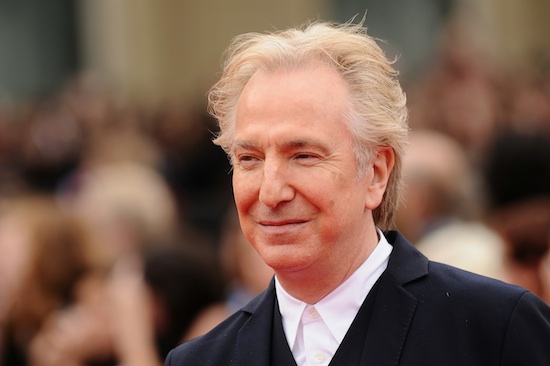
Alan Rickman sat down with New York Times theater reporter Patrick Healy early Saturday morning to discuss acting, his famously distinctive voice, and his role in the new Broadway play "Seminar."
- Johanna Barr
Alan, thanks so much for joining us.
I'm not awake yet. I don't know that I'm actually here.
First theater role?
The very first thing I ever did was at what we call primary school, when I was 7 years old. I played the title role in a play called "King Grizzlybeard." I remember my mother cutting a little triangle of fur out of a rug for the beard.
When you started your training at RADA (Royal Academy of Dramatic Art), how similar was your voice to what we hear now?
What I hear is not what you hear, so I don't even know what you're talking about. Certainly, when I was at drama school it was the source of many complaints, big problems, a great deal of work. A lot of it's just to do with the architecture of your mouth, the sound you make, and it's about the muscle strength in your tongue, so once it all gets taken apart -– you know, I had big problems.
What sorts of problems?
That I had very lazy diction, that I had a spastic soft palate ... my voice teacher said, 'You sound as if your voice is coming out of the back end of a drainpipe.' So that's how cruel drama school is. It means, I suppose, basically, that I had to learn to bring it all forward. It was all kind of traveling backward.
Differences between the New York and London theater scenes?
It is very different performing here, in a good way, because you really do feel that theater is part of the life of this city, in a way that you don't in London. London's so spread out as a city, anyway. There isn't in any way the same kind of contact between people working. You know, you come out of the theater and we go over the road to a bar or restaurant, and there's a bunch of actors who are all doing a show, so you get to know each other here. Of course, it's kill or be killed here. You get a bad review and you're off anyway.
On whether he has a penchant for playing villains.
Well, you'd have to name them and you'd run out after about three, I think. Because, if you say "Die Hard" and "Robin Hood," then you start going "uhh..uhh…" because everything else is a bit more complicated than that.
Did [Harry Potter author] J.K. Rowling know ahead of time what would happen with your character, Snape?
Yeah, she knew everything. It's fair to say that she put the ending into a safe. She knew how it would finish.
Did she tip you off?
Before I said I would do [the first film] I said I had to talk to her. We spoke the next day, and she gave me a very small piece of information ... that let me know there was more to him than met the eye.
Can you share that with us?
No. I promised her I never would.
Having played the character all those years, did you have emotional or cathartic moments toward the end?
With the last film, it was very cathartic, because you were finally able to see who he was. It was strange, in a way, to play stuff that was so emotional ... but satisfying on all sorts of levels. You know, Ray [Fiennes, who played Voldemort] and I had a scene where you just thought, well, finally it's just a couple of actors talking to each other, with no special effects.
On holding a wand.
Holding a wand is not the most threatening thing. And pointing it at Dame Maggie Smith, who you've grown up worshipping from the cheap seats at the National Theatre, and she's pointing it at you … and she can arch an eyebrow like nobody. Thank god for the sheets of flame
Did he ever consider not acting in all eight of the movies?
No, I wasn't going to let anyone else finish him.
On differences between acting and directing.
It's satisfying to be in control of the visual aspect, as much as anything else. I'm passionate about storytelling, and sometimes you want to tell a story as an actor, and sometimes, now, you want to tell a story as a director. It takes a long time -- or it did for me -- to get to the point where you've actually got something to say. All these hopeful faces staring at you on the first day, it's a bit challenging. But over the years you've learned that one of the greatest things a director can say to an actor, that will make them immediately trust you, is the actor will ask a question and the director will say, 'I don't know.'
What about Leonard, your character in Seminar?
The story is of four young writers in New York who hire a mentor, pay him $5,000 each for a ten-week mentoring period, and pretty early on are pretty resentful of the money they've given him. He's a truth-teller. Relentlessly truth-telling … but fortunately he's also a human being. You do wonder whether that's going to be the case or whether he's just a destroyer, but he's not.
What would Leonard think of Jo Rowling's writing?
He'd probably be very jealous of what she's achieved. I'm sure he'd have to say -– her storytelling. You can't fault it, really.
http://www.huffingtonpost.com/2012/01/09/the-new-york-times-arts-leisure-weekend_n_1193051.html
No comments:
Post a Comment